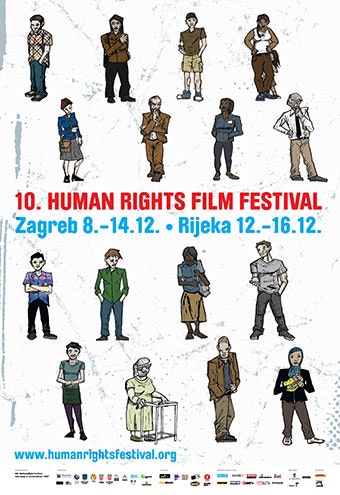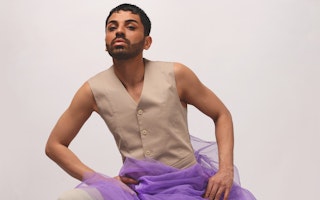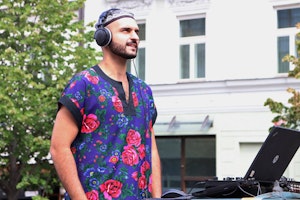Croatia’s Human Rights Film Festival in Tenth Year
By Petar Milat & Eleanor Kelly

Croatia’s Human Rights Film Festival, an annual Zagreb–based film festival is celebrating its 10th anniversary this year. The festival will be held in two towns: December 8 to 14 in Zagreb and December 12 to 16 in Rijeka. The director of the Human Rights Film Festival, Petar Milat talks about the history of the festival, promoting human rights through culture, and why the communal experience of watching a film together is still an important one.
Can you tell me about the Human Rights Film Festival, from its early years until now?
The Human Rights Film Festival in Zagreb emerged in 2002. It was established by two prominent independent Croatian cultural organizations from Zagreb. One is the Multimedia Institute, and the other is called the Association for Development of Culture or URK for short in Croatian. Both organizations run two important venues in Zagreb, the Multimedia Institute runs Club MaMa, and URK runs Club Močvara, which are probably among the most important independent venues in Croatia.
So first of all, the idea when we set up the festival in 2002 was actually to engage video and film in cultural activism, and to promote, in a very broad sense, something that we call the culture of human rights. In 2002 when we had the first festival, it was actually organized in MaMa and Močvara, in two smaller venues. It was almost a semi-guerrilla way of doing a film festival, but then within a short period of time we got into much bigger venues in Zagreb. The Human Rights Film Festival was one of the very first big film festivals at the time in Zagreb, and so it got huge visibility and sparked a lot of interest.
Since 2007 we have a new, central location in Zagreb, which is the Cinema Europa. The festival itself has established itself as a space where a Croatian audience can experience engaged auteurs-cinema. On the other hand, we never want to forget our first mission to promote human rights through culture.
What sort of films are in the line up for this year’s festival?
Our line up reflects our attempt to cover, let’s say, all the bases, both to be popular in the sense that you always try to reach a mass audience, but on the other hand, never to make any compromise in the sense of the content. So usually our line up, like this year, includes both feature films and a very strong documentary selection. We also have a number of quite interesting, more artistically or experimentally inclined documentaries, but always engaging with some of the topics that we think are of importance today.
What kind of topics are covered in this year’s Film Festival?
This could be maybe best described by two of the headliners from the features program that we have this year—one is Pablo Larrain’s No, one of the Cannes winners from 2012. No begins during the build-up to Chile's 1988 plebiscite, a nationwide referendum in which a vote was held to determine if President Augusto Pinochet would return to office for another eight years, having held onto power since his 1973 overthrow of Salvador Allende. The vote was to be cast on a simple ballot: “Yes” for the return of Pinochet, “No” for something else. It’s about an advertising-expert who has been asked by a coalition of activists in Chile of the late ’80s to set up a campaign to withdraw the military junta.
For the closing of the festival we will have Olivier Assayas, an important French film maker, and his film Apres Mai, or in English, Something in the Air. The film examines the lives of young people in the post-1960s period in France engaged in social struggle. The film is reminiscent of Francois Truffaut, one of the founders of French New Wave cinema. Related to the film, are Assayas’s own memoirs which came out in 2002 and look at his coming of age during the long, dispiriting hangover from May ’68—the “years of lead” during which the radical left lost its momentum.
How important a medium is film when we discuss human rights?
Film is important in a sense, not just as a mass cultural product but as a medium with a surrounding social environment. Film is a perfect medium to get people engaged in discussion; it is a meeting place. Despite the digital revolution, the communal experience of sitting in a cinema together with a few other hundred people and watching something singular and specific is an important one.
The festival is also a window of opportunity to see the most recent productions that won’t yet be widely available. Getting films via the internet cannot replace the communal experience of watching films together.
How is the film festival received in Croatia? What kind of reaction have you got so far?
Since the lineup was announced we have got an impressive critical reaction from film critics and the media. Though we screen socially engaged, socially aware films, we are regarded as one of the most important Croatian film festivals out there in the sense that we really show a very representative line-up of titles. This is a film festival for all of Croatia.
From July 2012 to June 2013 Croatia holds the Presidency of the Decade of Roma Inclusion. The Decade of Roma Inclusion 2005–2015 is an unprecedented political commitment by European governments to improve the socio-economic status and social inclusion of Roma.
During Croatia’s presidency Open Society Foundations is supporting a number of cultural events aimed at promoting Roma inclusion. The first of these cultural events is the Human Rights Film Festival, which has chosen Roma as the main focus of this year’s festival.
Petar Milat is the director of the Human Rights Film Festival in Croatia.
Until May 2021, Eleanor Kelly was the regional head of communications for the Open Society Foundations.


